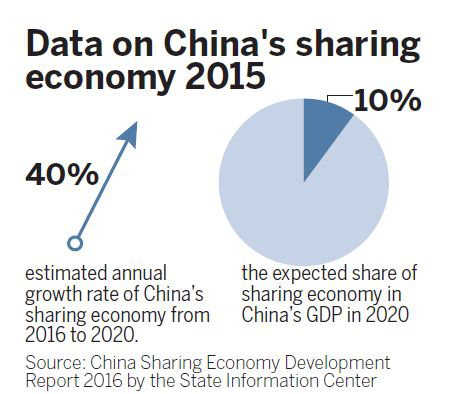Caring for the world by sharing

For the past year, I have been living alone in Beijing, away from my parents who live in Hunan province. Until recently, there was something in my neighborhood that used to annoy and attract me at the same time-the delicious aroma that would emanate from my neighbor's kitchen.
The divine scent would instantly teleport me to my mom's kitchen thousands of miles away. And equally quickly, I'd be jolted back to my senses in my Beijing high-rise flat, where I'd order yet another home-delivery of an insipid meal from a nearby restaurant.
Ain't I glad the saga of tasteless commercial food has ended, thanks to the boom in sharing-economy ventures in China.
By placing an order through an app, I can now savor authentic Hunan cuisine in the comfort of my Beijing home. Thank you, 2016.
The app I use offers personalized home-cooked meals to users within a radius of 3 km. The food is prepared by home-based entrepreneurial people who have the wherewithal and the time to offer such a service for a fee.
I can visit the app-registered host (cook) to pick up my meals or have the food home-delivered.
Sharing economy truly took hold in China last year and blossomed into a model of legitimate mainstream businesses this year.
Cars (cabs), bicycles, homes, pricey fashion, everyday clothing, bags, accessories ... all are being hurled into the sharing economy.
Women aged 22 to 35 are loving the new lifestyle possibilities. For 188 yuan ($27) a month, three high-end dresses can be rented at a time, used with no time-limit, and shipped back (for free).
Youngsters find the rent-a-bike businesses "cool", given their "green" angle. A college student in Shanghai told me: "It's cool. I can rent and return the GPS-enabled bike wherever and whenever I like. By using a bicycle rather than a fuel-powered vehicle, I cut my carbon footprint."
Even State-owned firms are jumping on the sharing economy bandwagon, to make more efficient use of resources. For instance, the country's big three telecom carriers created a new firm called China Tower by pooling their telecom tower assets to avoid construction of new towers.
"It is a hard job, harder than many have expected, to manage a balance between growth and environmental protection. Sharing economy offers a good solution," a senior executive of China Tower said.























